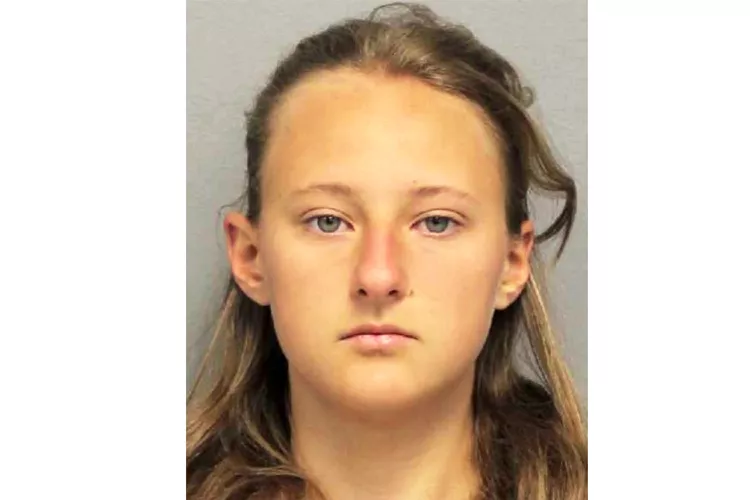
Sofia Koval, a 14-year-old teenage girl from Florida, is facing adult manslaughter charges following the death of her grandmother, Yevheniia Koval, earlier this year.
The Incident
On May 23, 2024, the Broward County Sheriff’s Office responded to a distress call at a Lauderdale Lakes, Florida residence.
Sofia’s father had left his 14-year-old daughter alone with his mother, Yevheniia Koval, 79, while he visited a friend.
Upon his return, he found his mother unresponsive, lying on the floor with visible bruises.
Emergency personnel arrived and transported the elderly woman to Broward Health Medical Center, where she was later pronounced dead.
An autopsy revealed that Yevheniia’s death was a homicide, setting the stage for a thorough investigation by the Broward County authorities.
Through their investigation, detectives identified Sofia as the primary suspect.
It is alleged that she beat her grandmother with a belt and the walker that Yevheniia relied on, leading to fatal injuries.
The arrest report details how Sofia allegedly confessed to her father, admitting that she attacked her grandmother, claiming it was in self-defence.
According to Sofia, her grandmother had already been dying, and she “helped” her pass away.
She reportedly expressed remorse after the incident, crying and appearing regretful.
Sofia’s father provided additional context to the authorities, stating that his daughter had been struggling emotionally since moving to Florida from war-torn Ukraine.
He described behavioural issues that had arisen after Sofia witnessed the ongoing conflict in her homeland and was separated from her mother.
On the day of the incident, he had taken Sofia’s phone away as a disciplinary measure, possibly triggering a violent outburst that ended in tragedy.
The arrest of a 14-year-old girl in connection with such a severe crime immediately caught the attention of both local law enforcement and the media.
Sofia was initially taken into custody on charges of second-degree murder but was later formally charged with manslaughter.
After being held in a juvenile detention centre, the decision was made to charge her as an adult, and she has since been transferred to the Broward County Jail, where she remains in protective custody.
Prosecutors decided to charge Sofia as an adult after reviewing the evidence and circumstances surrounding the case.
Broward State Attorney Harold F. Pryor explained that despite Sofia’s young age, the severity of the crime warranted the decision to move the case to adult court.
“Because of the heinous nature of the crime and after considering everything presented by the defence so far, I believe it is appropriate that this case should be handled in adult court,” Pryor stated.
He acknowledged that the prosecutors were considering all options while working with Sofia’s defence team to seek a resolution that balanced her accountability with her age and the circumstances of the offence.
If convicted, Sofia could face a maximum of 15 years in prison, the penalty for manslaughter.
However, there remains the possibility that she could receive juvenile sanctions, which would significantly reduce her sentence.
In the juvenile justice system, Sofia could be sentenced to a maximum of three years in a correctional facility, with supervision continuing until the age of 21.
Since Sofia is not a U.S. citizen, another consequence of a conviction could be deportation to Ukraine upon completing her sentence.
Sofia is being held without bond as the legal proceedings continue.
Court records do not indicate a formal plea, and her legal representation has yet to comment publicly on her case.
The defence team is likely to raise concerns about Sofia’s mental health, given her traumatic background in Ukraine and the challenges she faced adapting to life in the U.S. after witnessing the devastation of war.
Experts have speculated that Sofia’s behaviour could be tied to trauma stemming from the war in Ukraine, where she spent her formative years.
Children exposed to war zones often exhibit signs of post-traumatic stress disorder (PTSD), anxiety, depression, and other mental health issues.
These factors, combined with the stress of migration and separation from her mother, may have contributed to Sofia’s violent actions.
However, the legal system faces the difficult task of weighing these psychological factors against the gravity of the crime she is accused of committing.
Advocates for juvenile justice reform argue that charging Sofia as an adult may not be the most appropriate course of action, given her age and the apparent psychological issues she has been facing.
They point out that while Sofia’s actions were undeniably tragic, her potential rehabilitation should also be considered alongside her punishment.
At the same time, others, including members of Yevheniia Koval’s extended family and community, are struggling to reconcile the loss of a beloved family member with the circumstances of her death.
The decision to charge minors as adults has been a contentious issue in the United States for years, with critics arguing that the practice fails to account for the developmental and cognitive differences between children and adults.
How the legal system will balance the competing concerns of justice, accountability, and Sofia’s psychological well-being remains unclear.
The prosecution has emphasized the severity of the crime. At the same time, the defence is expected to highlight Sofia’s traumatic background and her age as factors that should mitigate the harshness of any potential sentence.
For now, Sofia Koval remains in custody, her fate to be determined by the courts.





